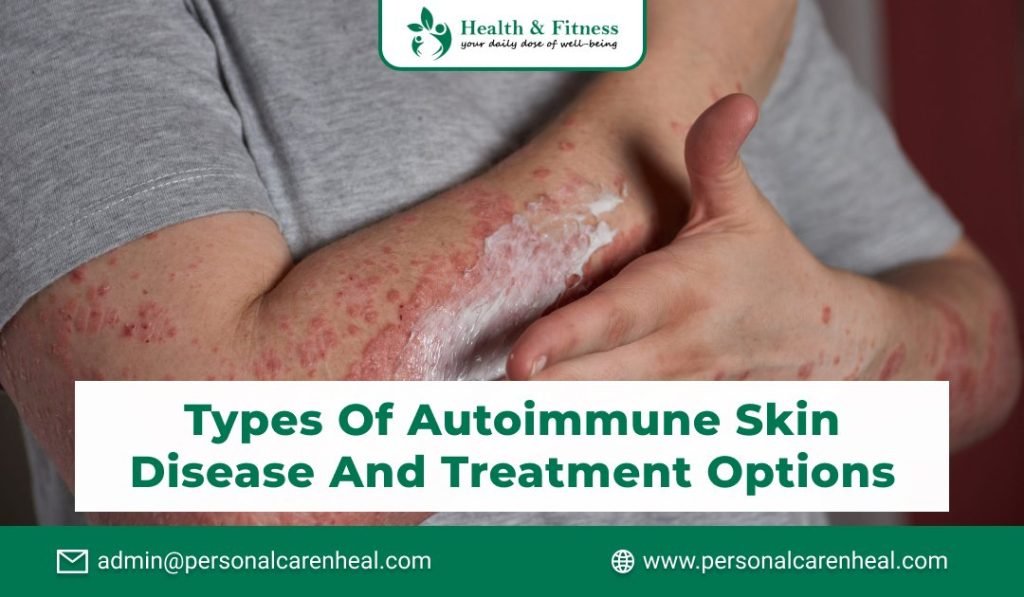The human body reacts differently to autoimmune diseases where the immune system of the body attacks its own tissues. Based on the condition you may have, an autoimmune disease can have an impact on your body areas, including muscles, joints, and organs. Most commonly, autoimmune diseases affect the skin. In today’s blog, we’ll discuss common autoimmune skin conditions along with their treatment options.
Common Types of Autoimmune Skin Diseases
There are various types of autoimmune skin conditions, and each comes with different symptoms, causes and risk factors, and how they are identified and treated. Here are the types of autoimmune skin conditions:
Psoriasis
Psoriasis condition causes the immune system to become overactive and increases the growth of cells. Skin cells will increase in layers of red plaques covered in silver-white patches of dead skin. Various things can trigger this condition, including sun exposure, skin injuries, infections, medications, stress, and alcohol.
Lupus of the skin
Skin lupus is an autoimmune skin disease where the immune system harms healthy skin cells. Skin symptoms include itching, pain, redness, and scarring. While lupus can’t be cured and can be treated effectively. Treatment includes skin protection, medication, and lifestyle changes.
Dermatomyositis
Dermatomyositis is a condition that affects muscles, but it also can have an impact on the skin. It causes muscle weakness, stiffness, and soreness. People with these types of problems may have difficulty swallowing and breath shortness. People with dermatomyositis get skin rash that appears on the upper part of the body.
Behcet’s Disease
With Behcet’s disease, blood vessel inflammation throughout the body can be caused. This condition can cause eye inflammation, mouth sores, genital lesions, and skin rashes. Various treatment options can be used to treat this problem.
Ocular Cicatrical Pemphigoid (OCP)
OCP is a condition that can affect both the mucous membrane of the eyes and the skin. With OCP condition, the white blood cells attack the membranes and the skin. It can be treated with medications to ease the immune system and slow down or stop the autoimmune process.
Autoimmune Skin Condition Symptoms
The skin serves as a protective barrier to the body to protect against trauma. It helps regulate your internal body temperature. The skin is made of five distinct layers. The top two layers are affected by autoimmune skin diseases. The top layer is known as the epidermis. The underlying is the dermis and it has vital cells, structures, and tissues.
When there is a gap between two layers, blisters may form. These blisters can be large or small and have fluid that has damaged or dead skin. With autoimmune skin problems, the body creates antibodies that attack proteins needed for skin health and as a result, blisters form. Other symptoms of autoimmune skin problems include:
skin scarring
chronic fatigue
skin inflammation
stiff and swollen joints
pitted, thickened and ridged nails
cracked skin that may cause itching or bleeding
Autoimmune Skin Disease Treatment Options
The most common method of treating autoimmune skin problems is by treating underlying causes. Medical professionals may recommend creams or lotions when a small area of the skin is affected. The most common medications that may be prescribed by your doctor:
Corticosteroids
Methotrexate
Hydroxychloroquine
Dapsone
Dapsone
Biologics
However, it is suggested to go for a checkup first before start applying any cream or lotion on the affected area because a doctor will diagnose first and then, prescribe you medication.
Can over-the-counter treatments work?
Many people ask if it is worth using over-the-counter products. Well, it depends on the skin condition because severe autoimmune skin conditions can’t be treated with over-the-counter products. Moreover, the following are a few over-the-counter products:
Hydrocortisone
Coal tar, salicylic acid, or urea
Menthol or calamine
Is eczema an autoimmune disease?
The eczema is a vast term for several inflammatory skin conditions. Eczema is a condition that causes inflamed, itchy rashes on the skin. With light skin tone, red patches may appear. On the other hand, on darker skin, the patches can be brown, grey, or purple. Most types of eczema may have a link to the immune system, but there is limited evidence.
Is asthma an autoimmune disease?
While asthma is caused by an immune response, it doesn’t fall under autoimmune disease. Instead, it is a chronic lung disease because it affects the lungs.
Is PCOS an autoimmune disease?
Technically, PCOS is not an autoimmune disease. PCOS is an endocrine disorder. Endocrine problems are related to your hormones. With PCOS, your body generates too many androgens, particularly testosterone. Even though all women need a small amount of testosterone to function normally because too much testosterone is not a good thing.
Neurological autoimmune disease list
Take a look at the following autoimmune neurological disease list:
Multiple sclerosis
Transverse myelitis
Optic neuritis
Neuromyelitis Optica
Acute disseminated encephalomyelitis
Autoimmune or paraneoplastic encephalitis
Spasticity
Rare neuroimmunological conditions
Conclusion
If you are noticing autoimmune skin symptoms, don’t wait until they become worse. Take medical help as soon as possible and avoid using lotions or creams without taking a prescription from your doctor. Moreover, keep reading such types of informative blogs by subscribing to Personal Care N Heal.
Our Popular Blogs:



